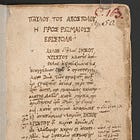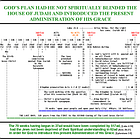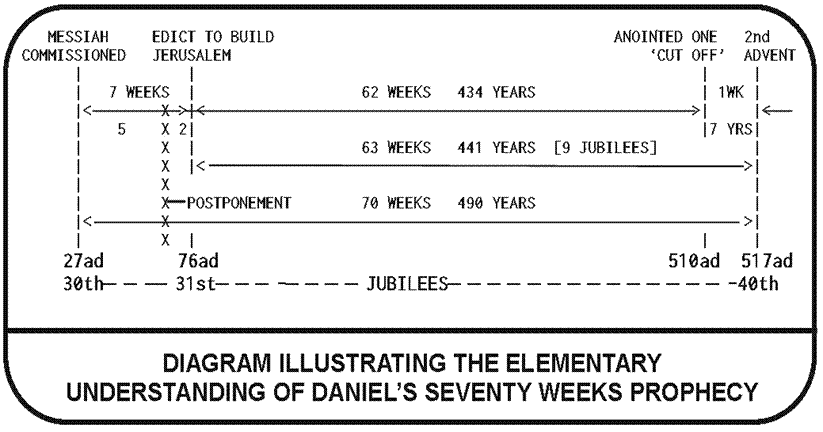BG 67: The Calling of the Mature Christian - Part 1
How does God define our maturity?
How does God define our maturity ?
The apostle John tells us:
He that says ‘I know Him’ and does not keep His commandments, is a liar, and the Truth is not in him. But whoever keeps His Word, in him truly the love of God has been matured. By this we know that we are in Him.
[1 John 2:4]
The writer to the Hebrews refers to ‘maturity’ many times. He describes an important source when he tells us that maturity depends upon the deep study of God’s expression. He says:
Everyone who partakes of milk is unskilled in the Word of Righteousness, for he is an infant. Solid food is for the mature, who on account of habit have their senses exercised for discerning both good and evil
[Hebrews 5: 13-14]
The apostle Paul describes the foundation of maturity in a Christian by this conclusion:
Put on bowels of compassion, kindness, humility, meekness, long-suffering, bearing with one another and forgiving each other… and to all these add love which is the binding of maturity.
[Col 3:12]
Paul tells us that these characteristics hold maturity together. By these, maturity has reached its full and intended end.
A few years before however, when writing to the Philippian Christians, Paul reveals that he is mature when he says:
Not as though I had already attained, either were already mature, but I earnestly endeavour to seize that for which also I am possessed by Christ… I pursue the goal for the prize of the High Calling of God in Christ Jesus… As many as be mature, be of this mind.
[Phil 3:12]
Paul is commissioned by God to be the unique apostle to the Nations, whereby he is authorised to teach and lead us to understand the purposes of God.
What was this ‘earnest endeavour’ to which he refers ?
Does it relate to our maturity and our On High calling ?
This article addresses the following:
The Meaning of Important Words used in this article
The Establishment of The Kingdom of Heaven in Israel by the Work of Messiah and His Apostles
Postponement of The Kingdom of Heaven in Israel and its consequences.
The God given Commissions of The Apostle Paul.
A. The Hope associated with Paul’s First Commission.
B. The Condition which Governed The Christians who were generated by God during the Period of The Acts of The Apostles.
C. The Condition which governed The Christians who were generated by God after The Acts Period closed in 62ad.
The Meaning of Important Words used in this article
In order to carefully consider these questions, we must first define some important words which are used within the subject of this article. By perceiving their correct use we will be able to understand the mind of Paul.
Mature
The only Greek words with this meaning which are included in this study are the nouns: teleiotEs and teleiOsis. The verb is teleioO and the adjective teleios. The verb means: ‘to make perfect or complete’, thus one who is perfect or complete.
Calling
The noun that we are concerned with here: ‘a calling or invitation’ is expressed in the Greek by: klEsis, klEseOs, klEsin, klEsei.
Hope
Every Christian has a Hope which is to be realised in the future activity of God, even the Lord Jesus Christ. All Hope that one day we shall meet our Lord in righteousness and Truth and that henceforth we shall then enjoy with Him, a perfect and enlightened relationship The time, the place and condition will vary according to His needs.
Mediator
A human or spirit being who acts as a ‘go-between’, such as an angel who delivers messages from God, an apostle or elder who acts directly under the authority of God, or an unclean spirit who seeks to deceive. There are many examples in the Old Testament and in the New up to the closure of the Acts of the apostles. Since the revelation and opening of the present Administration of God’s Grace in 62ad [Eph.ch.3] there have been No God empowered mediators except Christ Himself. [2Tim 2:5]
Kingdom of Heaven
Yet to be established in Israel. Its opening and setting up during the time of The Christ’s First Advent and His apostles, although postponed in 62ad at the closure of the Acts of the Apostles, has yet to be completed. It is the subject of the remaining 63 weeks of Daniel’s prophecy. It is known as The Kingdom of Heaven because during this period [Isaiah 66:1]. God acts from His throne in heaven by heavenly mediators. This period, and that of the Millennium is known as The Kingdom of God. During the 1000 year Millennium, God takes the throne of Israel in The Lord Jesus Christ, having no further need of mediators, He becomes personally present upon earth after all the nations have become His. [Rev 11:15 and 19:11-16]
The Church
A badly translated word for the Greek ekklhsia. A noun meaning a gathering of citizens called out from their homes into some public place. In Christian terms, it implies a positioning and authority out of Jesus Christ, even as Ministers are positioned out of the Prime Minister. It has nothing to do with buildings, no matter how exalted.
This study is based upon a revised sequence of Paul’s second seven letters written after Acts 28:28. Please see leaflet By Grace No. 44:
The Establishment of The Kingdom of Heaven in Israel by the work of The Messiah and the Apostles.
Before we can begin reaching forward to resolve this most important relationship of the On-High Calling of God, we must recognise the correct sequence of events upon which it is developed. The doctrine contained in Paul’s letters is progressive. Two Godly events have caused this:
The Spiritual blinding of The House of Judah in 62ad
The hidden revelation of the present Administration of God’s Grace in 69ad
Messiah was given a commission for the work which His Father required Him to perform. That commission is described by Isaiah [Isaiah 61:1-2] and quoted by Messiah when He, by The Law, returned to His home town of Nazareth at the time of the Jubilee in 27ad. [Luke 4:16-21] when He was 30 years old.
This was the beginning of the Seventy Weeks prophecy which the prophet Daniel received from Gabriel the archangel. 490 years were determined upon both Daniel’s people and upon Jerusalem in order:
To finish the transgression
To bring in everlasting righteousness
To make an end of sins
To seal up the vision and prophecy
To make reconciliation for iniquity
To anoint the most Holy
Daniel was also told that, in order to perform this, the first seven weeks [49 years] of the seventy weeks of years would precede the command to restore and to build Jerusalem. It is evident that this period of forty-nine years was a preparatory period during which the work of Messiah’s commission would lay the ground for its completion in the following 63 weeks of years [441years]. This fact is established by carefully comparing the six points of Messiah’s commission, given in Isaiah [ch.61 verses 1-2], with the six points relating to Daniel’s revelation, listed above. See By Grace No:25 The Seventy Weeks of Years:
From the beginning of Messiah’s ministry in 27ad, He worked with the disciples whilst continuing to complete His commission [Mark 16:20] throughout the period of The Acts of The Apostles. At the end, after thirty-five years, in 62ad, the Jews were judged to be unprepared and were therefore deprived of their Spiritual understanding and the expected establishment of their kingdom [Acts 28:26-27]. This is their present condition, but the Scriptures tell us that it is not permanent [Isaiah 35: 4-5]. They will recover their Spiritual understanding at a future time when the remaining 14 years of the first 49 years [seven weeks] will be completed.
49 years [seven weeks]—[62ad—27ad] = 14 years [two weeks].
Here then is the plan of Daniel’s prophecy initiated by the commissioning of The Christ in 27ad [Luke 4:16-21] showing the introduction of the present Administration of God’s Grace, hidden until Paul revealed it in 69ad. The first seven weeks [49 years] have not yet been completed, fourteen years remain before the edict to build Jerusalem can be expressed by God’s appointee, Cyrus. [Isaiah 44:28 to 45:1-3]
During this coming fourteen year period of preparation and restoration there will be many resurrections relating to both the Houses of Judah and that of The House of Israel. These are the ‘two sticks’ of Ezekiel’s prophecy [ch. 37] and this is the time of their unification: The Whole House of Israel.
It has been necessary to describe this procedure in order to show that God’s work with Israel from the time of Christ’s ministry to the establishment of the Kingdom in Israel at the end of the first seven weeks [49 years], has been interrupted by this very long period of time in which we are at present living.
Postponement of The Kingdom of Heaven in Israel and its consequences
During this period of interruption it is evident that God has seen fit to impose upon The House of Judah, the true Jews [Revelation 2:91 & 3:92], a probationary period with trials and chastisement. Expressed in His Gematria by the number forty. It is upon the basis of this figure that the duration of the period can be established. See By Grace No. 27 - What Happened at Acts ch.28:
Having postponed His activity with these Jews in 62ad, after seven years God introduced a special Administration by which He is acting in Grace alone towards all mankind. This is described in Paul’s last letters, to both the Ephesians and Colossians. This important fact is considered later. We must first recognise Paul’s different commissions.
The God given Commissions of The Apostle Paul
We come now to take a closer look at the purposes of the apostle Paul’s ministries. These began at the time of his meeting with the Messiah on the road to Damascus. Luke records the commission that God gave him at that time:
He is a chosen vessel unto me to bear my name before the nations, and kings and the children of Israel.
[Acts 9:15]
Ananias described Paul’s meeting with the Messiah thus:
Brother Saul, The Lord, even Jesus has appeared unto you in the way…
[Acts 9:17]
Paul describes the occasion when talking to King Agrippa::
At midday in the way I saw O King a light above from heaven the brightness of the sun shining round about me
[Acts 26:13]
He informs King Agrippa of his commission and a future one, when he repeats what God said to him. See By Grace No:41:
I have appeared unto thee for this purpose, to make you a minister and a witness both of these things which you have seen and of those things in the which I will appear unto you.
[Acts 26:16]
Thus we are told about two commissions, one in the past and one yet to come, both of which are characterised by the appearance of The Christ. The Greek verb is optomai meaning seeing with the wide open eyes.
A. The Hope associated with Paul’s First Commission
Thus, together with all the disciples, he preached Christ and Him crucified revealing to all who believed the Gospel that at The Christ’s Second Advent He will be personally present to assume the Kingship of Israel. This will be the realisation of The Hope of all those Christians out of both Israel and the nations, who believed during the time of the apostles. It includes also all those Christians who identify with the instructions given to Timothy and Titus following the Spiritual blinding of the Jews in 62ad. Their Hope is also based upon this revelation given to Paul:
The Lord Himself shall descend from heaven with a shout, with the voice of the archangel and with the trumpet of God: and the dead in Christ shall rise first: then we which are alive and remain shall be caught up together with them in the clouds, to meet The Lord in the air: and so shall we ever be with the Lord.
[1 Thess 4:16]
Following which:
Behold, I show you a mystery; we shall not all sleep, but we shall all be changed, in a moment, in the twinkling of an eye, at the last trumpet: for the trumpet shall sound and the dead shall be raised incorruptible, and we shall be changed
[1Cor 15:51]
These wonderful events before the thousand year reign and personal presence of The Christ, follow not only the seventy weeks of years of Daniel’s prophecy, but also all those prophetic statements relating to The Last Days. Leading up to these events, Daniel tells us that during this last of the seventy weeks, in the midst of the last week he [i.e. ‘the Prince that shall come’] shall cause the sacrifice and the oblation to cease. At that time:
Many shall be purified and made white, and tried, but the wicked shall do wickedly and none of the wicked shall understand: but the wise shall understand… Blessed is he that waiteth and cometh to the thousand three hundred and five and thirty days.
[Dan 12:10-12]
B. The Condition which Governed The Jews and the Small Number of Gentiles who were generated by God during the Period of The Acts of The Apostles.
Besides this Hope in the Christ’s Second Advent, what other characteristics defined all those who believed following the initial pouring out of The Spirit of God at the Festival of Pentecost in 30ad ?
Salvation could only be found amongst the Jews to whom it was directed. Also to a few Gentiles to provoke the Jews to jealousy. Christ had told the Samaritan woman: ‘Salvation is of The Jews’.
They cast lots to allow God to determine whom He would choose to teach and serve them, their Elders and Deacons.
Each member was empowered by The Holy Spirit with specific and perfect Godly talents for the benefit and building up of each group.
Twelve disciples had been chosen for a specific purpose. These disciples were commissioned by God to proclaim in perfect Truth amongst the Jews scattered in the world, that their Messiah had appeared and His Kingdom in Israel had begun. An additional Jew, Paul was later chosen by God to proclaim this Gospel of the Kingdom in Israel to the nations, in order to provoke the Jews to jealousy. These commissioned disciples became apostles.
Three of these apostles, James, John and Peter wrote to the scattered Christian Jews encouraging them in the face of their persecution. One apostle, Paul wrote words of guidance and encouragement to the Christian groups of Jews and Gentiles at Thessalonica, Corinth, Rome and in Galatia.
All the living Christians at that time were expecting the manifest Godly kingdom in Israel ruled by the resurrected King David prior to the Second Advent. Their question had been: ‘Lord, wilt thou at this time restore again the kingdom to Israel?’ but Israel would have to wait until the second Advent to cease being a vassal state.
The need for apostles and prophets would shortly cease because their purpose during the preparation of The Kingdom in Israel had ended. The apostles continued to provide a pastoral service during the following transition period beginning in 62ad, until the new Administration was revealed in 69ad.
This, in a nutshell, was the condition of all those groups formed from the Houses of Israel and Judah with the small number of gentiles who came to believe the Good News of the Salvation of Jesus Christ prior to 62ad and onwards to 69ad. At that time, Spiritual understanding was taken away from the Jews because they had refused to accept wholeheartedly their Messiah. As a tribe they continue in Spiritual blindness to-day.
This action of God resulted in the postponement of the Kingdom in Israel together with those Godly facilities with which it was ordered. At that time, the responsibility for the distribution of The Gospel was transferred to The Nations by the Godly commission of The Written Word. [Acts 28:28]
C. The Conditions which governed the Christians who were generated by God after The Acts Period closed in 62ad.
So what were the characteristics of the groups of Christians following 62ad when in God’s eyes, Israel had become just another nation open to the Good News contained in the newly published and circulated John’s Gospel. [Acts 28:28].
The Godly record has provided us with several letters written immediately following this act of God in 62ad. Paul, being the responsible person that he was, saw the immediate need to ensure that the postponement of the kingdom and the loss of all its associated facilities would cause some re-organisation of the existing Christian groups. New instructions would be needed to ensure that any new Christian groups were founded according to the revision of God’s needs.
Three of these letters were written by Paul to Titus and Timothy, and Peter saw fit to write to the scattered Jews following instruction from Paul [2 Peter 3:15-16]
From these letters we can note the following changes:
The kingdom in Israel is no longer proclaimed. Only discussed and referred to. All the conditions of Israel relating to this Kingdom do not apply in the Gentile world to which the Good News of our Saviour Jesus Christ is now commissioned.
The Jewish ritual of ‘Breaking Bread’ derived from the Israel ritual of Passover, is no longer mandatory. Because the Kingdom condition has been postponed.
The Spiritual gifts remained only in those who had previously received them. There is no new distribution amongst new Christians, because ‘building up the kingdom’, is not the purpose of this present Administration of God’ Grace.
The Christian groups are still to be guided and served by Elders and Deacons. [1Tim ch.3]. However they must now be chosen by the members of the Christian groups themselves, not by a divine lot [Acts 1:26] but as Paul instructed Timothy and Titus [1Tim ch.3 & Tit ch.2].
When organising Christian groups to-day, many have wisely accepted these changes, particularly recognising that the Gifts of The Spirit, given to Israel for the purpose of building up The Kingdom in Israel, are no longer available, despite such counterfeit and demonic activities as the ‘Toronto Blessing’.
They look to their personal resurrection and change at the time of The manifestation of The Christ at His Second Advent. This is the Hope revealed to Paul which is quoted in part A. Many Christians to-day accept the time of The Second Advent as their Hope, to be resurrected and changed. This belief is recorded and established in Paul’s letters prior to 62ad, when the distribution of The Spoken Gospel was authorised and limited to the Jews. [Salvation is of The Jews John 4:22]. Confirming this, Paul tells Titus:
Looking for that blessed Hope and the appearing [ἐπιφάνειαν] of the glory of The Great God and Saviour, Jesus Christ.
[Titus 2:13]
When Paul writes to Timothy the first time:
Keep the commandment spotless, irreproachable, until the appearing [ἐπιφανείας] of Our Lord Jesus Christ.
[1Tim 6:14]
And again, Paul’s statement to Timothy in his second letter:
The Lord Jesus Christ who will bring to pass, judging living and dead, and His appearing [ἐπιφάνειαν] and His kingdom.
[2Tim 4:1]
‘appearing’ [ἐπιφάνειαν] is directly associated with the Second Advent:
Then will be revealed the lawless one whom The Lord will consume with the breath of His mouth, and annul by the appearing [ἐπιφάνειαν] at His personal presence [παρουσίας]… The Second Advent
[2 Thess 2:8]
Thus the Hope of all those new groups of Christians generated by God after 62ad remains as that of those Christians who responded to the apostles’ preaching of the gospel of The Kingdom of God in Israel prior to that time. So also is the Hope of Evangelical Christians to-day, 2000 years later. They continue to base their doctrine upon that established by the apostles in their Gospels and epistles written before that year, but modified by Paul, the apostle to the Nations The Kingdom Gospel is now only described, no longer proclaimed, following God’s Spiritual blinding of the Jews in that year, 62ad.
Part 2 linked below:
I know thy works, and tribulation, and poverty, (but thou art rich) and I know the blasphemy of them which say they are Jews, and are not, but are the synagogue of Satan.
Behold, I will make them of the synagogue of Satan, which say they are Jews, and are not, but do lie; behold, I will make them to come and worship before thy feet, and to know that I have loved thee.









